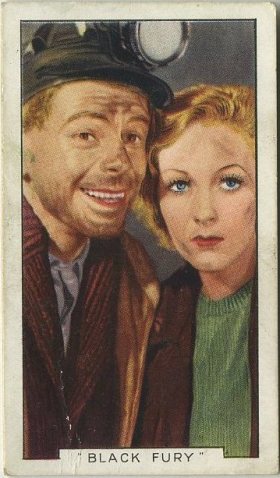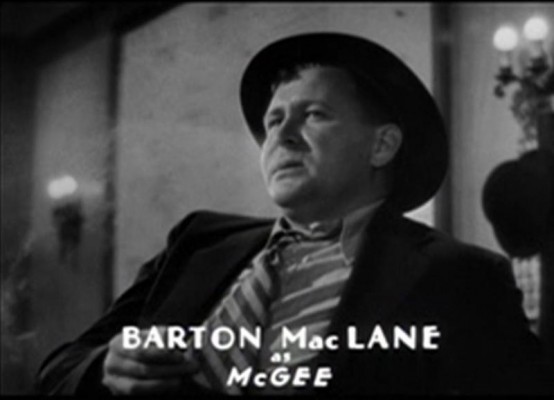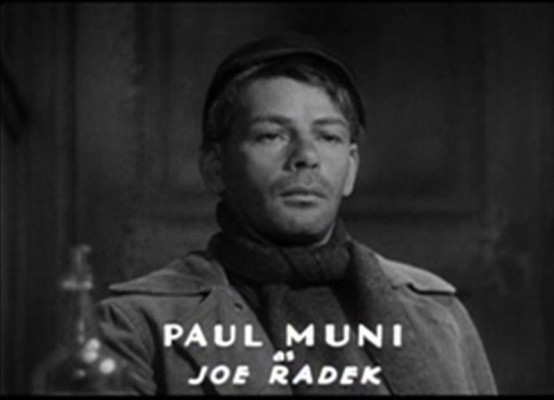Today is Paul Muni day on TCM’s Summer Under the Stars and the selections are especially good. Besides this brand new post, past articles of interest include my look at Muni in The World Changes (1933) and coverage of his incredible year in 1932 when Muni headlined theaters in back-to-back releases I Am a Fugitive from a Chain Gang and Scarface, while performing live in Counsellor-at-Law on Broadway. Black Fury and each of those other three movies I mentioned all play on TCM today. Check TCM’s schedule for times and be sure to check out “Watch TCM” if you miss any.
 Banned in Chicago and the state of Maryland with cuts demanded in New York, Warner Bros. Black Fury was torn from the headlines every bit as much as the earlier I Am a Fugitive from a Chain Gang (1932), yet Black Fury is not nearly as well-remembered because it muddled its message by playing both sides against the middle in an attempt to make everybody happy. In doing so the movie managed to anger both ends of the political spectrum.
Banned in Chicago and the state of Maryland with cuts demanded in New York, Warner Bros. Black Fury was torn from the headlines every bit as much as the earlier I Am a Fugitive from a Chain Gang (1932), yet Black Fury is not nearly as well-remembered because it muddled its message by playing both sides against the middle in an attempt to make everybody happy. In doing so the movie managed to anger both ends of the political spectrum.
Conservatives saw Black Fury as a rallying cry to unions, while liberals thought the movie excused the mine owners and were repelled by a union that preached half a loaf being better than no loaf at all. Instead of taking sides, Warner Bros. placed devil’s horns on an outside group of racketeers, who had villainous character actors J. Carrol Naish as chief agitator and Barton MacLane as hands-on enforcer.
While Black Fury failed to take on the big issues, the studio knew how to spin publicity out of all of that anger. Helping the movie along was an excellent cast headed by Warner Bros. most prestigious actor, Paul Muni, and an action-packed story with an especially exciting climax.
Coaltown of Black Fury could stand better working conditions, but all sides have generally been satisfied since the Shalerville Agreement had been passed. It earned the workers more money with their guarantee not to oppose management the price of the bargain. There’s always going to be some griping, but recent arrival Steve (Naish) is persistently vocal about the injustices the workers face.
Steve strikes a chord with the workers in complaining about “dead work.” That is, all of the preparatory work that the miners do prior to beginning the actual mining process: Clearing rock and stone, shoveling this mess away, carrying rails and laying track, timbering, and more. It is “dead work” because it is unpaid labor. Steve doesn’t have a hard time gaining accomplices when he complains about “dead work.”
But Joe Radek (Muni) doesn’t care. Joe’s a big, strong “bohunk” who works hard and stays happy because he’s in love with his Anna (Karen Morley). “Work hard like mule. Like Joe Radek,” Joe suggests over Steve’s protests. “Radek he don’t got worry.” Joe is happy to work. He’s earning money to buy a farm so he can marry Anna and take her away from Coaltown.
Everybody loves Joe Radek. The feeling is mutual: “Joe Radek, he like everybody and everybody like Joe Radek, no?”

Above: Google “bohunk” and this is what you get. I think we can safely extrapolate the meaning of Barton MacLane’s favorite word in Black Fury, “hunkie,” from this as well.
But Anna leaves Joe for one of Coaltown’s hired police (William Gargan) and Joe’s mood undergoes a significant change. On a night when most of his co-workers are at a union meeting that Steve is doing his best to break-up, Joe swallows as much whiskey as he can. The formerly happy-go-lucky bear of a man causes a scene when he stumbles drunk into the union meeting. His angry protests, general in nature though mostly related to his jilting by Anna, are largely incomprehensible and easily twisted into an anti-union diatribe by Steve. While Joe is blissfully ignorant of his actions, he causes the tide to turn in Steve’s favor and unrest to spread over the union floor.
After the meeting Steve phones his boss, Jenkins (Purnell Pratt), and tells him he has the men divided and a perfect pawn in popular Joe Radek. Jenkins drafts a letter to the bosses of Coaltown offering his private police service and any other assistance they may need for the coming trouble. Meanwhile, Steve has Joe made new President of the Union. Joe has no idea of his responsibilities, but is flattered by the title and struts through town with his chin sticking out. Steve is at his side and a growing group of dissatisfied workers trail him. The coal bosses decide to hire Jenkins and he and his muscle, McGee (MacLane), arrive to take over the camp.
The workers are locked out and scabs are brought in. People are losing their homes and being forced to leave Coaltown.
Everybody hates Joe Radek.
As usual, Paul Muni allows himself to become completely absorbed into his character. He had finished working on Bordertown only a week before shooting began on Black Fury, but he nonetheless managed to spend time in an east coast mining town where he studied the workers and perfected their accent. The movie was a huge hit and a personal success for Muni, who headlines a large cast and appears in most scenes. While Muni did not receive an Academy Award nomination for his part in Black Fury, he was a write-in candidate and finished second from that disadvantaged position.
Joe Radek has no politics. His only interests are self-interests. He wants to live, love and earn. His actions after losing Anna cause him to lose his best friend, labor leader Mike (John Qualen), and also his job after he is shut out of the mine. This leaves Joe with nothing and nobody except for Steve, the labor agitator. Joe eventually receives a chance at vindication, but the price is very high.
This opportunity for Joe’s redemption costs a life in the film. The incident enacted was based on a true event from 1929.
On February 10, 1929, Lieutenant Walter T. Lyster and Private Harold P. Watts killed John Barcoski. Those ranks were not official beyond their assignation by their employer, the Pittsburgh Coal Company. Lyster and Watts were a part of the Coal and Iron Police system that ruled Pennsylvania mine towns with an iron fist.
The Barcoski beating was drawn-out and savage. It began as a street fight, but escalated after Watts claimed that he was stabbed. Barcoski was then loaded into a police car and taken away to spend the evening being tortured at the Coal and Iron police barracks. It turned out that the inebriated Watts had cut himself when he stumbled into a pile of lumber with nails sticking out, but that didn’t save Barcoski from the savagery that followed. I’ll spare you the gruesome details, but reports specified damage from head to toe in a beating that was carried out continuously over a period of the entire evening. Barcoski died at the hospital the next morning. A technicality kept Lyster and Watts from death row. Instead they were convicted of involuntary manslaughter and sentenced to just 12 and 10 months jail time.The incident provided ammunition for legislator Michael A. Musmanno, who proposed a bill outlawing hired hand industrial police such as those who had killed John Barcoski.
Musmanno also wrote “Jan Volkanik,” an account of labor unrest at a coal mine that included a fictionalized version of the Barcoski killing. Warner Bros. bought the “Jan Volkanik” screenplay and later sought to distance themselves from Musmanno. His public reputation was growing and in order to gain better access to coal companies that they wished to use during production of Black Hell, later retitled Black Fury, it was felt he should not be mentioned until the film was completed. Then they could exploit his name to fullest advantage.
Paul Muni was excited to star in Black Fury, but thought the story needed more plot. He personally acquired Henry R. Irving’s unproduced play Bohunk and turned the property over to his Warner Bros bosses. Screenwriters Abem Finkel and Carl Erickson combined the Musmanno story and Irving play into the Black Fury script that was assigned to Michael Curtiz to direct.
By the time of Black Fury’s release Musmanno had become a better known public figure and he personally and publicly fought any attempts at censoring the film. Trade magazines commented upon all of the free publicity that Black Fury was receiving and the more perceptive voices wondered what the coal bosses were actually complaining about since they were most definitely not portrayed as the villains of the film. Andre Sennwald of the New York Times lavished praise upon the movie but notes that it is “far from being radical” and was actually “a rousing defense of the conservative viewpoint.” The headline of a Variety cover story in 1935 speculates that the film could carry Musmanno all the way to the Supreme Court of Pennsylvania.
Film critic Harold W. Cohen of the Pittsburgh Post-Gazette best describes Black Fury as “considerably less than a great social document,” but “a vicious, exciting melodrama.” That seems about right.
It is a good movie, though not as important as it wants you to think it is. Good pacing and story with an exciting ending, plus solid performances. Muni is excellent if you can get past his thick accent. His best scene comes from a hospital bed when Joe Radek finally realizes the course he must follow.
Other cast members take a distinctive back seat to Muni. Karen Morley disappears for a large chunk of the movie but provides a great emotional performance as always when we do get to see her. The couple played by John Qualen and Sara Haden are also worthy of praise. Barton MacLane is as vicious as he’s ever been in Black Fury and since he’s Barton MacLane we believe it.
Black Fury has been available as a made to order DVD-R from Warner Archive since 2011. You can pick it up on Amazon here with my thanks for using my affiliate link if you do. I did not request a review copy of Black Fury, so the screen captures on this page are instead from my own recording off Turner Classic Movies.
References
Online sources are directly linked within the body of the article. These additional books were also used in compiling this post:
- Druxman, Michael B. Paul Muni: His Life and His Films
South Brunswick and New York: A.S. Barnes, 1974.
- Lawrence, Jerome. Actor, the Life and Times of Paul Muni
New York: G.P. Putnam’s, 1974.
- Schindler, Colin. Hollywood in Crisis
New York: Routledge, 1996.









Excellent, Cliff. I agree on that climax. It was surprisingly elaborate and exciting.
Thanks, Will. Loved how nasty Barton MacLane was throughout this one. Nice brawl in that scene too.